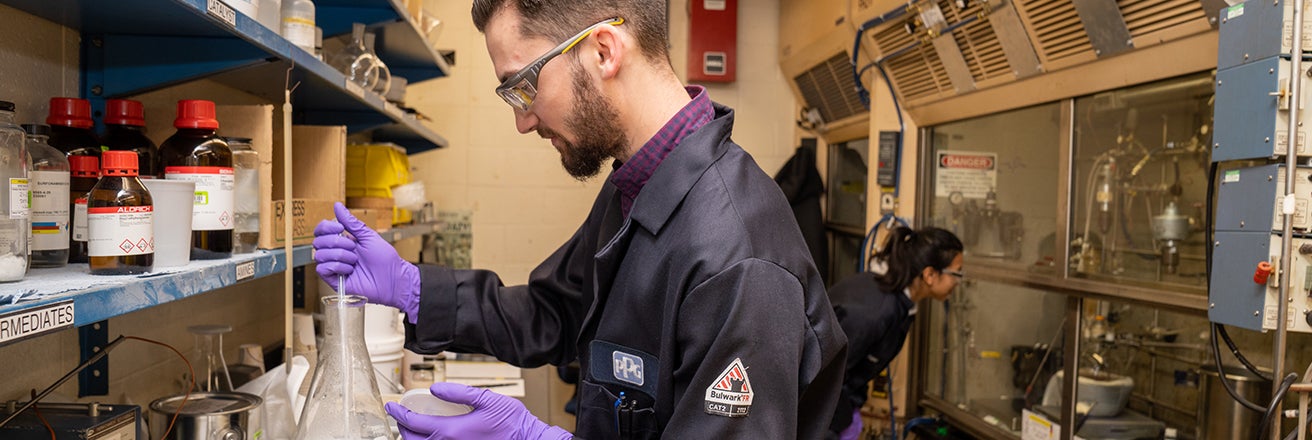We believe in advancing sustainability through collaboration.
We partner with a range of public and private entities to advance technologies and capabilities that create new sustainable benefits across our existing and future products and services. Our ongoing projects cover a wide range of research topics, including investigating the use of renewable and bio-based materials, improving recyclability and reusability. In addition, new low-energy cure approaches contributing to lower operating costs and lower-carbon economy are in-scope. Our commitment to responsible research and development applies to all legacy and acquired product lines.
Laser-based technology for curing coatings
We are working in collaboration with Lawrence Technological University, IPG Photonics and Whirlpool Corporation to pilot a lower-energy, laser-based powder coat curing technology for industrial coatings applications. PPG and our partners received a $1.2 million grant from the Department of Energy (DOE) to develop a novel method for curing powder coatings at lower temperatures. The laser-based curing technology has a variety of use-cases, with applications ranging from low-temperature systems (below 250 degrees Celsius) for powder paint, to higher temperature systems (above 400 degrees Celsius) for enamel and specialty coatings systems.
This technology is expected to displace thermal ovens over time, improving energy efficiency, reducing capital intensive paint shop operations and reducing on-site greenhouse gas emissions. In addition to delivering environmental benefits, the laser-cure technology has the potential to improve operational efficiency by reducing curing cycle times and limiting energy intensive air conditioning requirements, ultimately reducing the physical footprint required for the curing process. The research team plans to share our findings with various industry and stakeholder groups to maximize the economic and societal impacts of the project.
High-performance coatings to support the hydrogen economy
In 2024, PPG was awarded $6 million in funding from the DOE to contribute to the hydrogen economy, following a competitive proposal process. PPG is working with the DOE to develop novel high-performance coatings for proton exchange membrane electrolyzers, which split water molecules into hydrogen and oxygen gas. Our work is focused on developing precious-metal free coatings that extend the lifespan of electrolyzers and can replace the existing platinum-based coatings without increasing electrical resistance. This cutting-edge research will directly support the national clean hydrogen strategy and help support the budding U.S. clean hydrogen industry.
University of Michigan Multidisciplinary Design Program (MDP)
Last year, PPG decided to become a project sponsor for the MDP program for the 2025 session. The MDP program offers team-based, "learn by doing" experiences for first year undergraduates through masters degree matriculated students via participation in research or industry teams. The program is run through the college of engineering, however students in programs ranging from education, the arts, public health, public policy and others are in MDP program teams. PPG is sponsoring a project that engages engineering and design students along with a faculty mentor to investigate approaches to improve the sustainability of packaging used widely in our aerospace business.
Modeling drop impact in coating processes
PPG is sponsoring a research program involving experts in fluid mechanics and physics from the University of Minnesota and Northwestern University. Today, there are many gaps in properly modeling the spraying of coatings and predicting color, gloss, roughness, appearance and other important parameters of a sprayed and cured film. The ability to predict such properties in a sprayed film would have significant benefits by reducing waste and re-work in both research and for commercial scale, adding efficiency to the development cycle of new coatings and better optimization of formula ingredients.
Sustainable catalysts for coatings
PPG is sponsoring a research program at the University of Wisconsin to understand at a fundamental level the mechanism by which some well-known metal catalysts operate. Catalysts are critical to industrial processes because they typically lower the amount of energy or time needed for a desired chemical process to occur. By understanding how these metal catalysts operate, it is believed that more sustainable catalysts could be developed to drive these important chemical processes, improving the overall health profile of the process and potentially resulting in reduced waste and higher yields.
Fostering collaboration across the industry
PPG participates in conferences, industry associations and related meetings to learn about ongoing research and share our progress in developing more sustainable practices. In 2024, our research team presented at the Department of Defense (DOD) technical symposium and received an innovation award for our work on autonomous vehicle coatings that help shed contaminates such as dirt and water from vehicle sensors, eliminating obstructions that could be caused by snow, ice or other debris. We also held innovation days in Brazil and Mexico where we shared product highlights and new inventions with customers. This ongoing engagement helps our key stakeholders stay informed of our newest technology developments while also giving PPG employees opportunities to explore innovative new collaborations with other industry leaders to solve sustainability challenges.
Beyond our research partnerships, PPG engages broadly with industry associations and other stakeholders around the world. Learn more in the stakeholder engagement section. We also work closely with our customers to develop innovative products that address their greatest challenges. Learn more in the sustainably advantaged products section.
For more information about how we approach research partnerships, see the bottom of this web page.

